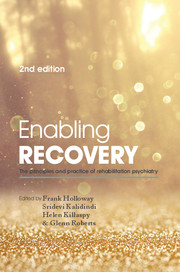Book contents
- Frontmatter
- Contents
- List of contributors
- List of figures, tables and boxes
- Preface
- Part 1 Setting the scene
- Part 2 Treatment approaches
- Part 3 Key elements of a rehabilitation service
- Part 4 Special topics in psychiatric rehabilitation
- 23 Special topics in psychiatric rehabilitation: overview
- 24 Rehabilitation and acquired brain injury
- 25 Autism spectrum disorder
- 26 Risk management in rehabilitation practice
- 27 Rehabilitation: an international perspective
- 28 Psychosocial rehabilitation across culture: the experience in low- and middle-income countries
- 29 Expanding the evidence base
- Part 5 Future directions
- Index
29 - Expanding the evidence base
from Part 4 - Special topics in psychiatric rehabilitation
Published online by Cambridge University Press: 02 January 2018
- Frontmatter
- Contents
- List of contributors
- List of figures, tables and boxes
- Preface
- Part 1 Setting the scene
- Part 2 Treatment approaches
- Part 3 Key elements of a rehabilitation service
- Part 4 Special topics in psychiatric rehabilitation
- 23 Special topics in psychiatric rehabilitation: overview
- 24 Rehabilitation and acquired brain injury
- 25 Autism spectrum disorder
- 26 Risk management in rehabilitation practice
- 27 Rehabilitation: an international perspective
- 28 Psychosocial rehabilitation across culture: the experience in low- and middle-income countries
- 29 Expanding the evidence base
- Part 5 Future directions
- Index
Summary
Introduction
Tuke's (1813) Description of The Retreat (see Chapter 17, ‘Rehabilitation in hospital settings’) compares outcomes for ‘moral treatment’ favourably with the less progressive Leeds Asylum and Bethlem Hospital. Moral treatment has many parallels with modern rehabilitation (see below) and emphasised: strengthening and assisting the patient to control the disorder; coercion being employed only when absolutely necessary; and promoting the general comfort of the insane, including occupation and physical health. While attempts were made to provide evidence for programmes of treatment aimed at ‘rehabilitation’, the first high-quality evidence for their effectiveness probably came from the highly influential Three Hospitals Study (Wing & Brown, 1970), which compared the characteristics of longstay patients with a diagnosis of schizophrenia and the clinical culture of the wards in which they were receiving treatment. The study was carried out over an 8-year period and its cohort design allowed for investigation of the ‘direction of causality’. One of the three hospitals had a good reputation for the care of long-stay patients, including a focus on occupation and rehabilitation. The main finding was a positive association between the degree of stimulation of the therapeutic environment and the severity of patients’ ‘clinical poverty syndrome’ (characterised by social withdrawal, poverty of thought and blunted affect). Patients at the hospital that provided better-quality rehabilitation also showed less clinical disturbance and more autonomy than those in the comparison hospitals, and staff had greater optimism regarding their recovery. The Three Hospitals Study highlighted the negative consequences of ‘institutionalism’, a concept now very familiar to us, eloquently described by Erving Goffman in his book Asylums: Essays on the Social Situation of Mental Patients and Other Inmates, published in 1961.
The social and political desire to ‘deinstitutionalise’ mental healthcare was one of the major drivers in the development of community-based services that took place in the latter half of the 20th century in the UK and other countries.
- Type
- Chapter
- Information
- Enabling Recovery , pp. 436 - 448Publisher: Royal College of PsychiatristsPrint publication year: 2015



